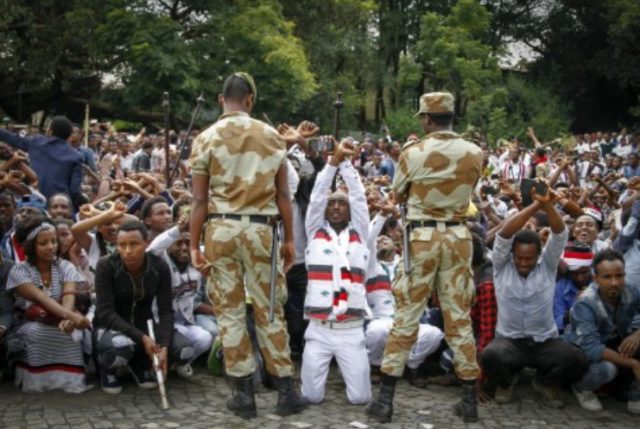By Paul Schemm /WP/
Ethiopia’s parliament voted unanimously Thursday to extend the country’s state of emergency for another four months after top officials warned of the continuing threat of unrest.
Ethiopia, Africa’s second most populous country and a regional power house, declared the state of emergency in October after widespread rioting broke out and foreign factories were attacked following the death of dozens at a cultural festival.
Ethiopia is a close U.S. ally in the fight against extremism in the unstable Horn of Africa region and has also become a magnet for foreign investment, especially in manufacturing.
Defense Minister Siraj Fegessa, the point man for the state of emergency, said there were still “some people who occasionally strive to disrupt peace and security,” according to the state-owned Fana Broadcasting. The extension was needed, he said, to ensure the prevailing peace reached “the point of no return.”
The state of emergency imposed broad restrictions on freedom of assembly and gave security forces wide powers to arrest people and search premises. According to government figures, more than 26,000 people were detained under the state of emergency, and most have been released. Opposition figures have said the number detained was much higher.
[Investors shy away from Ethiopia in the wake of violent protests]
Parts of the state of emergency have since been modified. Police are now required to have warrants to arrest suspects or search their homes, and some restrictions on media had been lifted, as well.
For more than a year and a half, Ethiopia’s Oromo people, the country’s largest ethnic group, have been protesting against their economic marginalization, corrupt local officials and what they say are attempts to confiscate their land for the country’s rapid development.
For more than a year and a half, Ethiopia’s Oromo people, the country’s largest ethnic group, have been protesting against their economic marginalization, corrupt local officials and what they say are attempts to confiscate their land for the country’s rapid development.
In October, police responded to protests at the Irreecha cultural festival with tear gas, triggering a stampede that killed more than 50 people by the official count. Activists say many more died.
In the aftermath, there were attacks against government- and foreign-owned factories, prompting the declaration of the state of emergency.
There were also antigovernment protests in the northern Amhara region. Ethiopia has blamed its neighbor Eritrea, as well as Egypt, for being behind the unrest.
The government investment bureau said in February said that there was a 20 percent drop in foreign investment during the latter half of 2016 compared with the first six months of the year.
Since the emergency was declared, however, protests have dropped off dramatically, though with social media blocked, it is often difficult to determine the situation in the remote countryside.
Seyoum Teshome, a university lecturer in the Oromia region, said the government extended the state of emergency because they don’t know how else to keep a lid on the unrest. “If they don’t extend the state of emergency, the protests may continue, because the people have no other means to express their grievances besides the open air,” he said.
For more than a year and a half, Ethiopia’s Oromo people, the country’s largest ethnic group, have been protesting against their economic marginalization, corrupt local officials and what they say are attempts to confiscate their land for the country’s rapid development.
In October, police responded to protests at the Irreecha cultural festival with tear gas, triggering a stampede that killed more than 50 people by the official count. Activists say many more died.
In the aftermath, there were attacks against government- and foreign-owned factories, prompting the declaration of the state of emergency.
There were also antigovernment protests in the northern Amhara region. Ethiopia has blamed its neighbor Eritrea, as well as Egypt, for being behind the unrest.
The government investment bureau said in February said that there was a 20 percent drop in foreign investment during the latter half of 2016 compared with the first six months of the year.
Since the emergency was declared, however, protests have dropped off dramatically, though with social media blocked, it is often difficult to determine the situation in the remote countryside.
Seyoum Teshome, a university lecturer in the Oromia region, said the government extended the state of emergency because they don’t know how else to keep a lid on the unrest. “If they don’t extend the state of emergency, the protests may continue, because the people have no other means to express their grievances besides the open air,” he said.
Teshome was detained in September just before the emergency was declared and was charged with inciting violence. He was acquitted by a jury but then was arrested again under the state of emergency and only released in December.
In the Oromia region in December, many locals told The Washington Post that their grievances had yet to be addressed and that they planned to protest once the state of emergency was lifted.
The government has promised to address poor governance at the local level, broaden the political participation of the opposition and pursue “deep reform” of state institutions.
Teshome said extending the state of emergency showed that little reform had taken place. “They are extending the state of emergency because they haven’t done any real change or real reforms.”

























